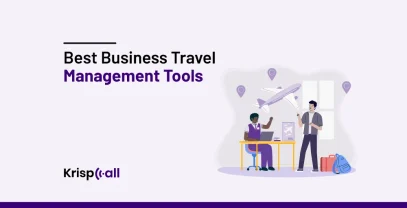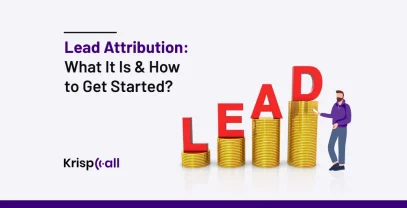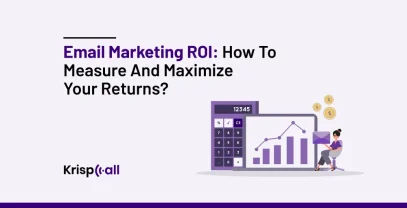Are you having trouble expanding your ecommerce business with the help of email marketing? Are you fed up with very low open rates, even higher opt-out rates, and no sales made through your emails?😮💨
If your business goals for the year are to attract more customers, get them to pay more attention, buy your product or use your service, or even outcompete other companies, effective ecommerce email marketing software should be implemented.
However, the search for the tool that will help attain these objectives may sometimes be daunting, given the multiple products in the marketplace. 😵💫
In this blog📖, we will show you the 10 best ecommerce email platforms useful for building lists, automation, and increasing sales. Without delay, let’s dive deep to understand the importance of email marketing software further and the factors to consider before choosing the right software.
🔑KEY HIGHLIGHTS
- Ecommerce Email Marketing is the process of promoting goods and services using emails by online businesses or retailers.
- Ecommerce Email Marketing collects email lists from customers’ email addresses and categorizes them based on the collection.
- Some of the best email marketing software for ecommerce are MailChimp, Omnisend, Drip, Moosend, and HubSpot.
- When choosing an e-commerce email marketing platform, consider automation, integration, customer support, pricing, and scalability.
What Is Ecommerce Email Marketing?
Ecommerce Email Marketing is a strategy in which online retailers use electronic mail to promote services, maintain good customer relationships, and drive sales. This includes sending emails to the client base, including welcome emails, promotional emails, and reminder emails for carts left behind.
Similarly, the e-commerce email marketing software process starts with collecting an email list from capturing customers’ email addresses on the company’s website. After collection, the email lists are categorized depending on the customer’s activity.
Such lists of messages are developed to deliver content at specific time intervals, leading the recipients to the ecommerce site to buy products.
For example, a clothing retailer may want to email a customer who searched for a winter jacket collection on your website but did not purchase it. The email could include an e-coupon that gives the customer a certain discount on winter jackets. This may impress customers and encourage them to proceed to the website to complete the purchase.
What Are The Key Components Of Ecommerce Email Marketing?
Ecommerce email marketing service is best for online sellers to stay connected with their audience and boost sales and customer loyalty. Furthermore, personalized and email marketing campaigns are leveraged by ecommerce email marketing software, which updates directly to customers’ inboxes.
Here are some of the key components of ecommerce email marketing:
- Content and Design: The content and design of the email are vital for capturing customers’ attention. The content should be fascinating, and the design should also be compelling. The subject lines should be clear, and high-quality images and strong calls to action should be used.
- Personalization: Another key element of ecommerce email marketing is the email content’s personalization. Personalizing emails relies on customer data to create customized emails addressing customers’ browsing history and purchase behavior.
- Mailing List Segmentation: E-commerce email marketing uses mailing list segmentation, which segments email subscribers into specific groups based on past purchase history, browsing behavior, and customer engagement levels. This ensures that every segment receives content according to their interests.
- Automation: Automation smoothens the workflow by sending mauls using predefined scheduling techniques. Likewise, using automation, emails are sent to the customers at the right time based on their actions, improving the effectiveness of the email marketing system.
- Analytics and Optimization: Both analytics and optimization play crucial roles in ecommerce email marketing. Analytics includes tracking and analyzing key metrics like click-through rates and open rates. The areas of improvement can be easily identified with proper analysis. Similarly, optimization optimizes the data-driven insights for better output.
10 Best Email Marketing Software For Ecommerce In 2024
The best ecommerce email marketing platforms will help your businesses effectively manage and optimize marketing campaigns, ensuring sales growth and management. Hence, email marketing software is essential for ecommerce as it provides seamless integration and automation.
The comparison table of the 10 best email marketing software for ecommerce in 2024 according to their pricing, features, and best for are given below:
| Sofware | Pricing | Features | Best for |
| MailChimp | Free (Up to 500 contacts), $13/month (Essentials), $20/month (Standard), $350/month (Premium) | Reporting and analytics, Email marketing, AI marketing, Audience Management, Marketing automation | Small to medium-sized businesses looking for an all-in-one solution. |
| Omnisend | Free (Up to 250 contacts), $16/month (Standard), $59/month (Pro) | Activity tracker, Automation reports, Sales dashboards, Unique coupon codes, Email templates | E-commerce businesses |
| Drip | $39/month (Up to 2,500 contacts), $89/month (Up to 5,000 contacts), $154/month (Up to 10,000 contacts) | Landing pages and firms, Reporting and analytics, Lead management, Automated email responses, Integration | E-commerce and online businesses |
| Moosend | Free (Up to 1,000 subscribers), $7/month (Pro), Custom (Enterprise) | Tracking, Lead generation, Personalization, Automation, Email marketing AI | Small businesses and startups |
| HubSpot | Free (Up to 2,000 emails/month), $15/month (Starter), $800/month (Professional), $3,600/month (Enterprise) | Reporting dashboard, Ad management, List segmentation, Cookie management tools, Email reply tracking | Businesses of all sizes, especially B2B |
| Klaviyo | Free (Up to 250 contacts), $45/month(Email), $60/month (Email and SMS) | Web forms, Templates, Campaigns, Automated flows, Behavior tracking | E-commerce and online businesses |
| ActiveCampaign | $15/month (Starter), $49/month (Plus), $79/month (Pro), $145/month (Enterprise) | Marketing automation, Reporting and analytics, Segmentation, Landing pages, Omnichannel marketing | Businesses of all sizes |
| GetResponse | $32.9/month (Email Marketing), $41.1/month (Marketing Automation), $82.9/month (E-commerce Marketing) | Advanced segmentation, Marketing automation, Landing pages, Webinars, Integrations | Small to medium-sized businesses |
| MailerLite | Free (Up to 1,000 subscribers), $9/month (Growing Business), $18/month (Advanced) | Automation templates, Integral, Landing pages, Activity dashboard, Multivariate testing | Small businesses and freelancers |
| Brevo | Free (Up to 300 emails/day), $9/month (Starter), $18/month (Business), Custom pricing (Enterprise) | Email deliverability, Inbound parsing, Easy CMS integration, Dashboard and data exploration, Universal inbox | Small to medium-sized businesses, especially B2C |
Furthermore, these user-friendly email marketing software provide reliable customer support and high deliverability rates. The 10 best email marketing software for ecommerce in 2024 are:
1. MailChimp
MailChimp is an all-in-one marketing automation system that assists companies in coordinating their e-mail campaigns, organizing marketing activities, and researching customer databases. Its pricing is also affordable for small businesses.
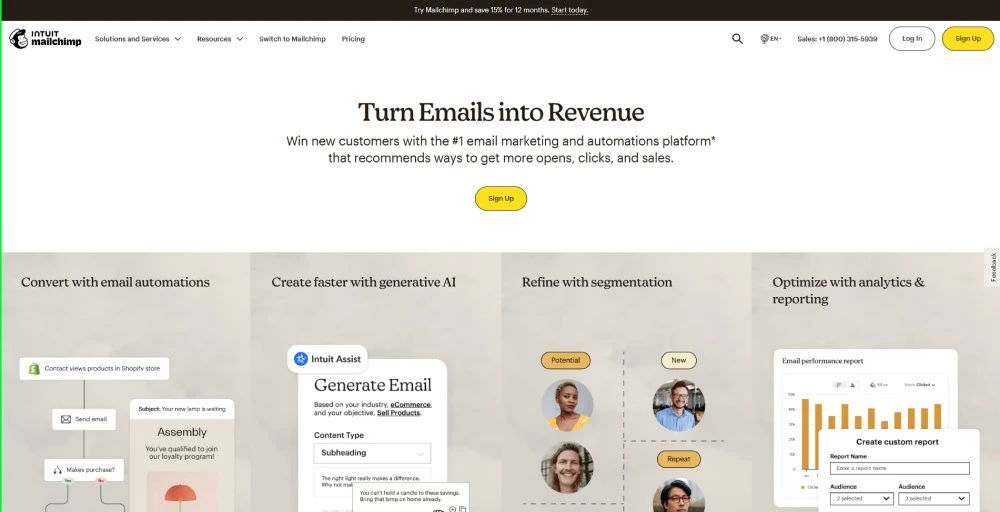
Moreover, it is one of the most popular email marketing services for sending emails, which is important for increasing customer engagement. It offers comprehensive functionalities and a simple interface. Similarly, it integrates well with other significant e-commerce solutions, making it appropriate for small to medium-sized businesses.
💡Features
- Reporting and Analytics
- Email Marketing
- AI Marketing
- Audience Management
- Marketing Automation
✅Pros
- Easy for new users to learn their services.
- Allows thorough reporting.
- Offers over 500 integrations and add-ons.
❌Cons
- Not all the templates are available in the free plan.
- We can’t schedule email in the free plan.
- The website builder is too simple for many businesses.
💲Pricing
| Plan | Price | Contacts | Monthly email sends |
| Free | $0/month | Up to 500 | 1000 |
| Essentials | $13/month | Up to 500 | 10X contacts |
| Standard | $20/month | Up to 500 | 12X contacts |
| Premium | $350/month | Up to 10,000 | 15X contacts |
2. Omnisend
Omnisend is an e-commerce email and SMS marketing automation tool that helps ecommerce businesses create multi-channel marketing campaigns. Also, it is an all-in-one software made especially for e-commerce stores, filled with features and effective email and SMS marketing solutions, including lead nurturing.
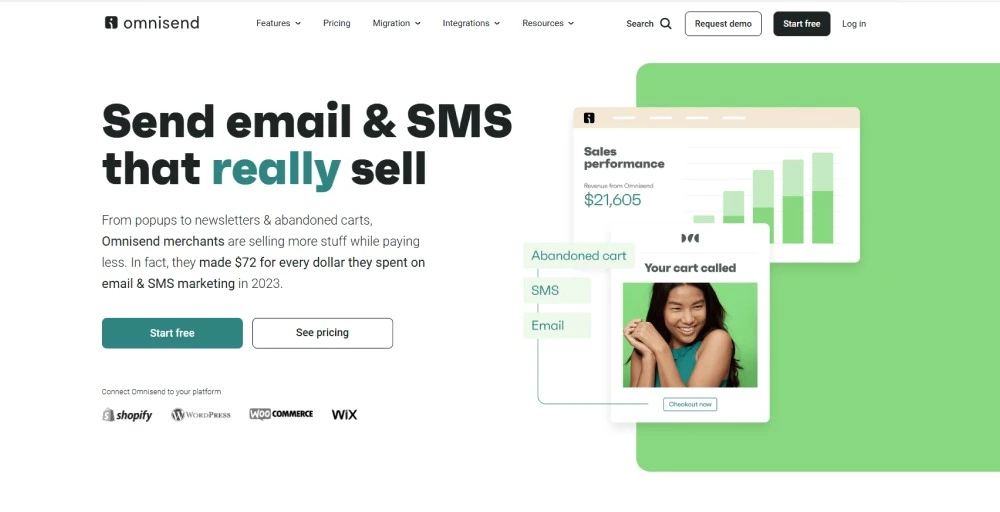
Omnisend can effortlessly connect with the most prevalent online selling networks, such as Shopify and WooCommerce. Programs in the Omnisend automation system, including segmentation and A/B testing, enable business organizations to create outstanding campaigns.
💡Features
- Activity Tracker
- Automation Reports
- Sales Dashboards
- Unique Coupon Codes
- Email Templates
✅Pros
- Easy to create, set up, and monitor.
- It gives 24/7 customer support.
- Automation is easy, like welcome emails, abandoned carts, etc.
❌Cons
- Has complex editing tools.
- Limited features in the free plan.
- Costly for small organizations.
💲Pricing
| Plan | Price | Contacts | Monthly email sends |
|---|---|---|---|
| Free | $0/month | 250 contacts | 500 |
| Standard | $16/month | 500 contacts | 6,000 |
| Pro | $59/month | 250 contacts | Unlimited |
3. Drip
Drip is an e-commerce customer relationship management tool commonly used to automate emails, use superior individualization techniques to target clients and master their cooperation.
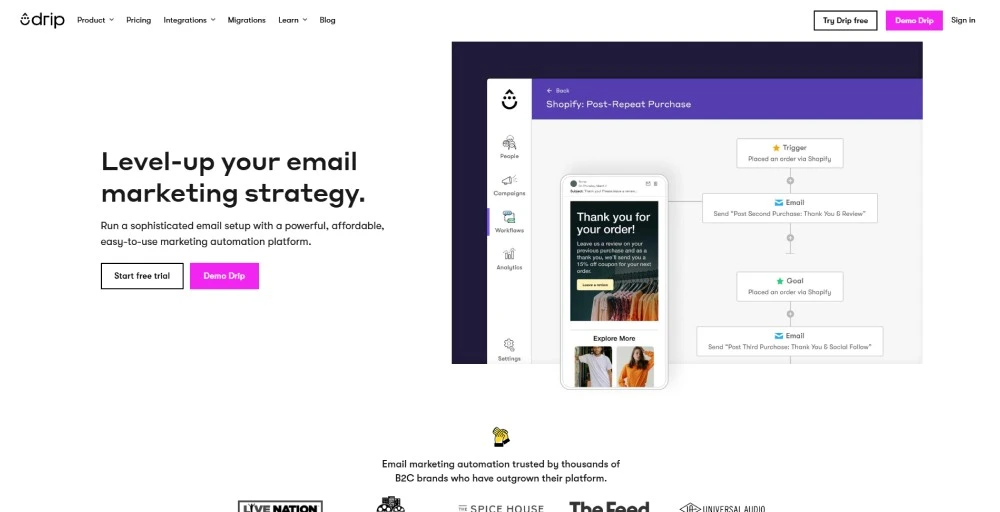
Drip is one of the most professionalized email marketing software, which increases customer engagement by providing better services and features. Meanwhile, it supports every ecommerce platform virtually while possessing tailor-made functionality, including dynamic product blocks and abandoned cart recovery.
💡Features
- Landing Pages and Firms
- Reporting and Analytics
- Lead Management
- Automated Email Responses
- Integration
✅Pros
- Provides robust security.
- Unlimited monthly email sends.
- It automatically adds subscribers to a list if they fit into a pre-defined segment.
❌Cons
- Drip’s navigation is confusing.
- Response time can slow.
- Provides fewer pre-designed email templates.
💲Pricing
| Plan | Monthly Price | Contacts |
| Free | $39 | 0 – 2,500 |
| Basic | $89 | 2,500 – 5,000 |
| Pro | $154 | 5,000 – 10,000 |
| Advanced | $246 | 10,000 – 20,000 |
| Growth | $370 | 20,000-40,00 |
| Professional | $487 | 40,000-60,000 |
| Enterprise | $570 | 60,000-80,000 |
| Elite | $670 | 80,000-100,000 |
4. Moosend
Moosend is a progressive and highly effective email marketing tool that aids businesses in creating and managing their mail campaigns. It is inexpensive, and this software suits businesses in their initial stages and startups.
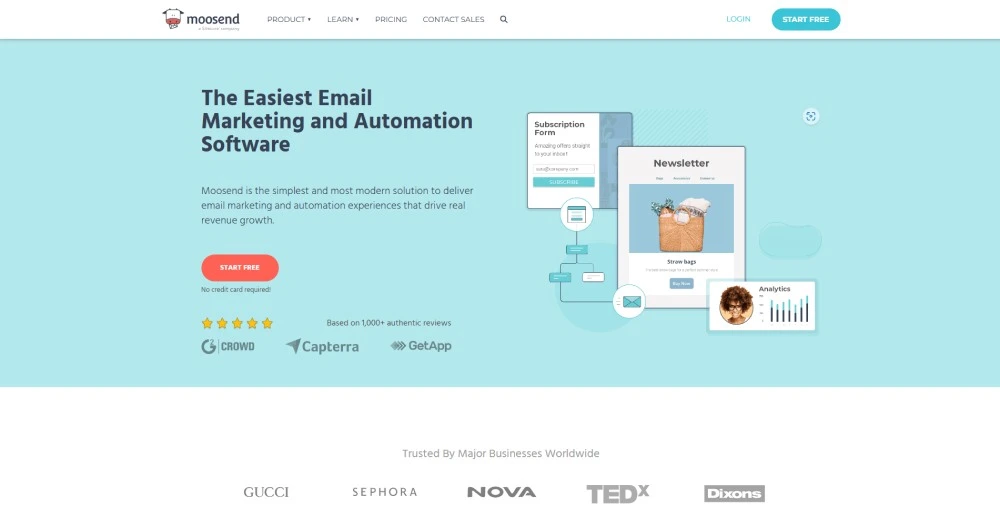
Furthermore, it provides the free tier option with basic features for up to 1,000 subscribers, a great plus for companies with restricted budgets. Not only this, but Moosend also includes basic features such as automation, segmentation, personalization, and A/B testing.
💡Features
- Tracking
- Lead Generation
- Personalization
- Automation
- Email marketing AI
✅Pros
- Tracks website visits.
- Supports transactional email options.
- Offers powerful features to help personalize your emails.
❌Cons
- Fewer third-party integrations in comparison to other tools.
- The signup form templates are not good.
- Live chat support can be slow.
💲Pricing
| Plan | Monthly Price | Subscribers |
| Free | $0 | 0-1,000 for 30 days |
| Pro | $9 | 0-500 |
| Moosend | Custom | Custom |
| Enterprise | Custom | Custom |
5. HubSpot
HubSpot is an all-in-one marketing, sales, and customer service software that targets customers through marketing emails, sales, and automation. It is also a CRM and an automation tool, which has been complemented by great emailing tools for marketing functions, suitable for all businesses, especially B2B ones.
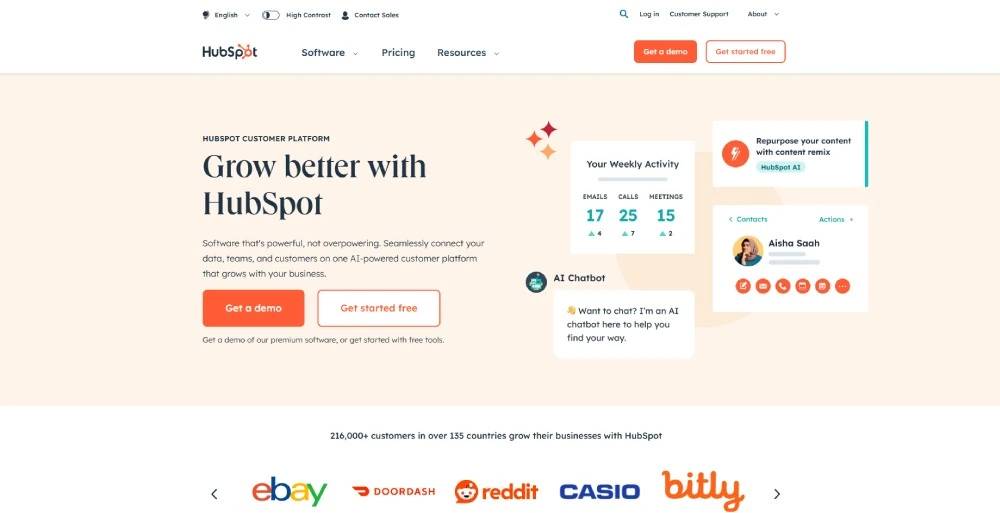
Likewise, HubSpot is best because it is closely connected to the e-commerce environment and offers powerful automation, selection, and analysis tools. Though it might be costly compared to other platforms, it offers its users a wide array of features and great customer support.
💡Features
- Reporting Dashboard
- Ad Management
- List Segmentation
- Cookie Management Tools
- Email Reply Tracking
✅Pros
- Easy and reliable to use.
- It is an all-under-one-roof platform that makes working easier for sales and marketing teams.
- Powerful marketing and sales automation.
❌Cons
- Contracts are not flexible.
- It is costly.
- Template customization can be challenging.
💲Pricing
| Plan | Price per month per seat | Contacts |
| Free | $0 | Free for 5 users |
| Marketing Hub Starter | $15 | 1,000 |
| Starter Customer Platform | $15 | 1,000 |
| Marketing Hub Professional | $800 | 2,000 |
6. Klaviyo
Klaviyo is an email marketing strategy focusing mainly on e-commerce companies and includes features like extensive analytics and individual marketing strategies. Likewise, it offers top-notch features like automation, segmentation, and analysis.
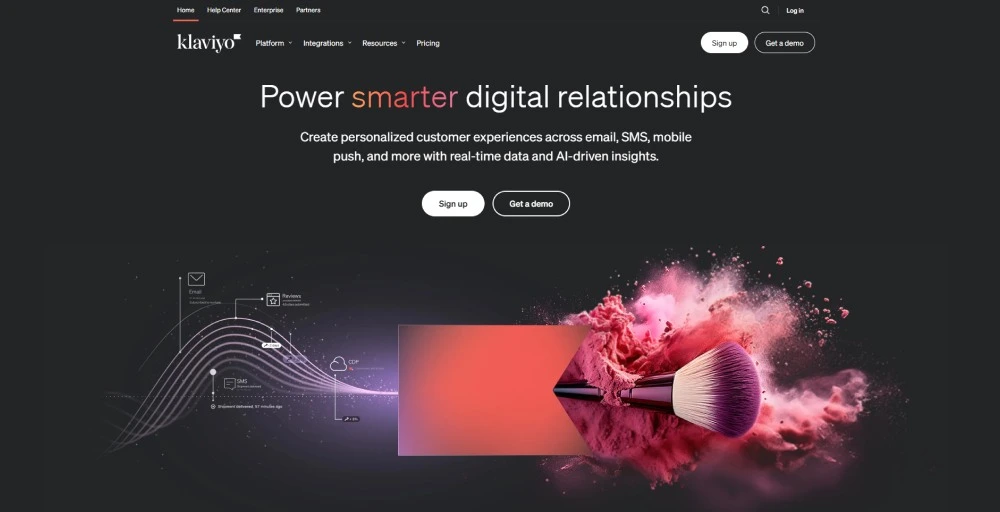
Klaviyo’s segmentation feature also allows businesses to develop colorful campaigns unique to customers, thus enhancing customer interaction and revenue production. Due to its scalability and comprehensive reporting feature, it is among the most suitable for growing e-commerce companies.
💡Features
- Web Forms
- Templates
- Campaigns
- Automated Flows
- Behavior Tracking
✅Pros
- It has an easy email design.
- Supports extensive third-party integrations.
- Email templates are responsive.
❌Cons
- Expensive for the additional features.
- According to the users, Klaviyo lacks customer support.
- Doesn’t offer spam testing.
💲Pricing
| Plan | Price per month | Contacts |
| Free | $0 | 0-250 |
| $20 | 251-500 | |
| Email and SMS | $35 | 501-1,000 |
7. ActiveCampaign
ActiveCampaign is an advanced customer experience automation solution that combines the aspects of email marketing, automation, CRM, and machine learning to ensure business growth and customer engagement.
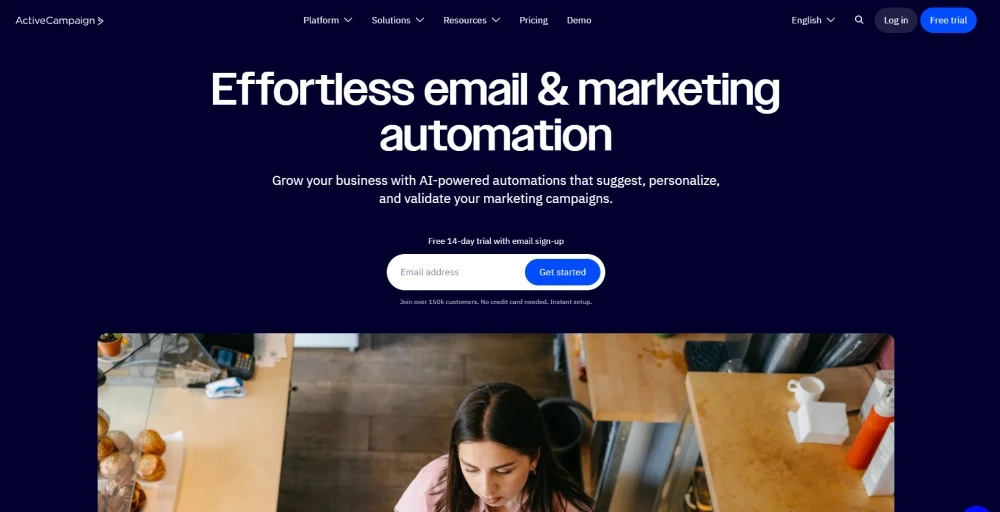
Similarly, using platforms like ActiveCampaign, businesses can create detailed segments, use predictive content, and design custom reports. Its pricing is also considerable, providing other features like automation, segmentation, integration, and reporting. So, based on the pricing and the number of features, it is good for small—and large-scale businesses.
💡Features
- Marketing Automation
- Reporting and Analytics
- Segmentation
- Landing Pages
- Omnichannel Marketing
✅Pros
- Provides top-notch analytics and reporting services.
- The free trial doesn’t require a credit card.
- Super easy to use.
❌Cons
- The response is slow, increasing customer dissatisfaction.
- Templates are basic in terms of design.
- Its free trial is limited to only 100 contacts and 100 emails.
💲Pricing
| Plan | Price per month | Contacts |
| Starter | $15 | 10X contact limit |
| Plus | $49 | 10X contact limit |
| Pro | $79 | 12X contact limit |
| Enterprise | $145 | 15X contact limit |
8. GetResponse
GetResponse is a marketing tool designed specifically for email marketing and online campaigns. It also provides solutions for email marketing automation, landing pages, webinars, and a workflow builder.
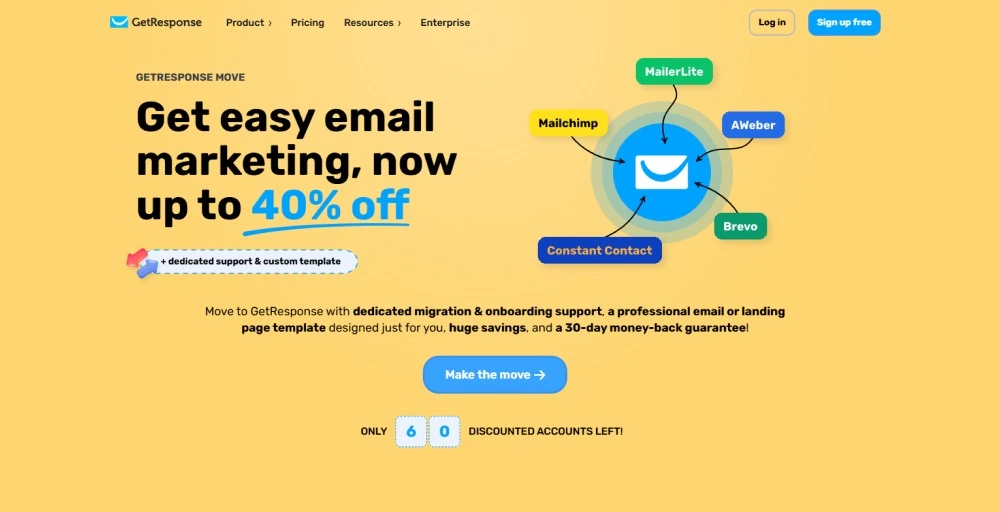
Furthermore, it offers a variety of features and is compatible with some of the frequently used e-mail marketing solutions, offering professional automation and segmentations. GetResponse’s data analysis and reporting features allow businesses to monitor and improve their marketing strategies.
💡Features
- Advanced Segmentation
- Marketing Automation
- Landing Pages
- Webinars
- Integrations
✅Pros
- It can’t integrate well with platforms like Studiopress.
- Possess generative AI capabilities.
- Have excellent deliverability rate.
❌Cons
- If your list grows, it can be expensive.
- The website and landing page builder are not flexible.
- No phone support is provided.
💲Pricing
| Plan | Price per month |
| Email marketing | $13.2 |
| Marketing automation | $41.1 |
| Ecommerce marketing | $82.9 |
| Max | Custom pricing |
9. Mailerlite
MailerLite is an email marketing software that can be used extensively to create, manage, and automate email marketing campaigns, landing pages, efficient workflows, and other necessary actions.
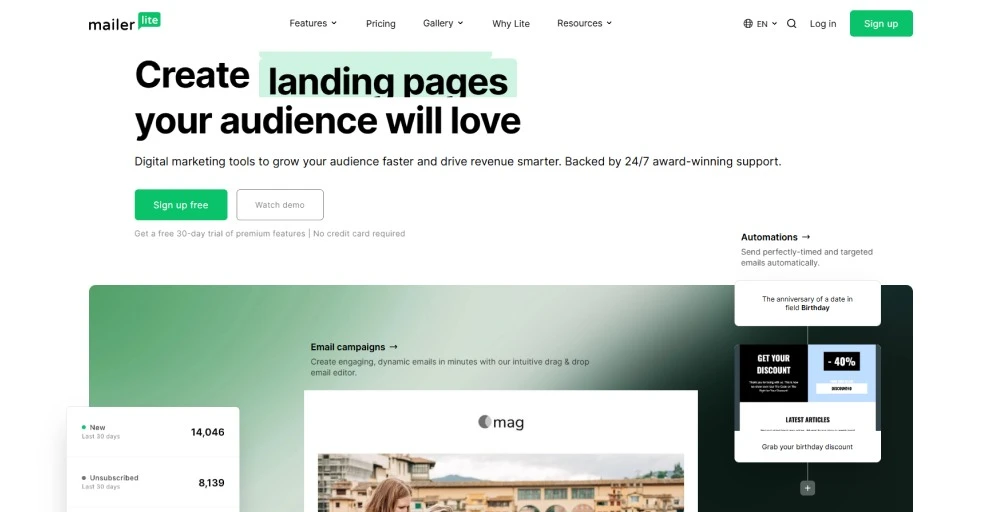
MailerLite is considered the best email marketing software today because it is budget-friendly and has simple navigation and design, making it suitable for business people and individual entrepreneurs. Also, if businesses integrate MailerLite with their online sales platform, they can easily create perfect email advertising campaigns for sales.
💡Features
- Automation Templates
- Integral
- Landing Pages
- Activity Dashboard
- Multivariate Testing
✅Pros
- It has a clean dashboard, so easy to use.
- Integrates with Facebook for advanced segmentation targeting.
- It has the option to sell paid subscriptions.
❌Cons
- No templates are available in the free plan.
- Lacks some advanced subscriber management tools.
- The new account authentication process can be unmanageable.
💲Pricing
| Plan | Price per month | Subscribers |
| Free | $0 | Up to 1,000 |
| Growing business | $10 | Up to 500 |
| Advanced | $20 | Up to 500 subs |
| Enterprise | Contact sales | Over 100K |
10. Brevo
The last email marketing software is Brevo, a marketing solution that helps with email marketing, SMS marketing, marketing automation, Customer Relationship Management (CRM), and transactional emails. Likewise, it is an extremely flexible solution for small to medium-sized B2C dealers.
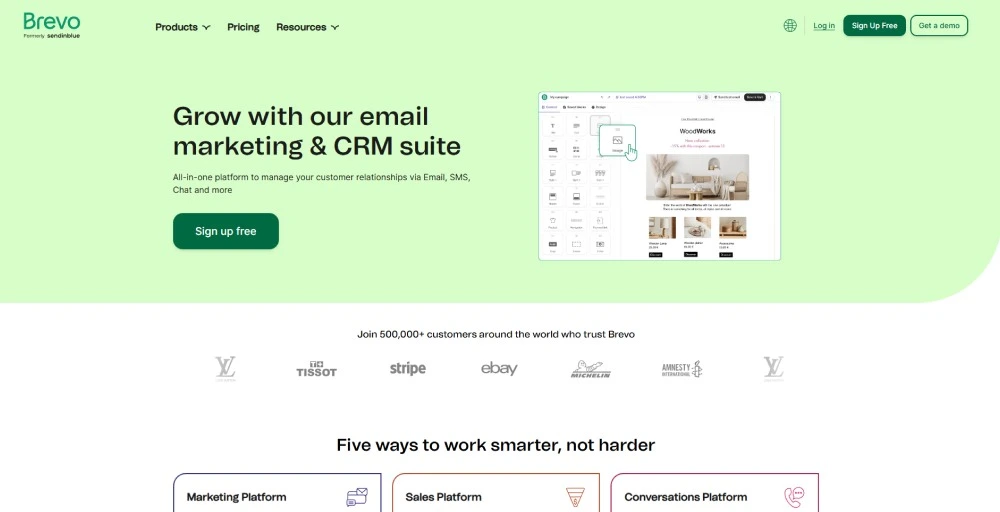
Additionally, Brevo provides features such as marketing through emails and short message service, workflow automation, and transactional emails. It also works harmoniously with other major e-commerce platforms and possesses efficient analytical and reporting features.
💡Features
- Email Deliverability
- Inbound Parsing
- Easy CMS Integration
- Dashboard and Data Exploration
- Universal Inbox
✅Pros
- It has solid email automation.
- The free plan offers free CRM software.
- Customer service is outstanding.
❌Cons
- The free plan has a daily sending limit of 300 emails.
- Expensive multi-user access.
- Takes a lot of time to re-create a builder on your own.
💲Pricing
| Plan | Price per month |
| Free | $0 |
| Starter | $9 |
| Business | $18 |
| Enterprise | Custom Price |
Which Ecommerce Email Marketing Platform Is Right For Your Business?
Several factors determine the kind of email marketing platform to use when running an e-commerce business. These factors can include the business size, goal, and financial capacity. Mailchimp is a platform for small businesses that automates numerous processes and offers rich reporting and analysis features.
Other tools, such as Klaviyo, HubSpot, or Constant Contact, may be more appropriate for more extensive e-commerce companies requiring more functionality. It stands out with extended e-commerce compatibility, automation, and rich analytics, delivering insights into customers’ performances.
Some of the essential features your business needs to consider while choosing the best email marketing software for ecommerce are:
1. Automation And Personalization
When you choose the best ecommerce email marketing software, make sure your chosen software provides powerful automation capabilities for sending relevant email messages based on the customer’s choices. This method is very effective since it guarantees that the emails are valid and timely and can help increase client requests and sales.
On the other hand, e-commerce email marketing should support dynamic content and enable the creation of unique emails for each customer. For example, customers’ names should be included in every email, and offers should be made specifically for the customer based on their previous actions.
2. Seamless Integration
Choose your ecommerce email marketing platform based on the integration it provides. Similarly, the software must be an organic fit with your current ecommerce solution for efficient marketing and increasing customer satisfaction and loyalty.
If your ecommerce email marketing software fits your current solution, then it helps automatically synchronize the customers’ data, which is essential in developing the campaign and analyzing the result. Good integration also means there is no need to enter data manually where errors are minimized.
3. Customer Support And User-Friendliness
Search for a platform with robust customer support and multiple support channels, such as live chat. Strong customer support can assist you in streamlining problems, features, and campaigns. Furthermore, detailed guides, tutorials, and responsive customer service are essential and should be included whenever possible to increase efficiency.
Also, make sure the platform is user-friendly. A user-friendly platform you can easily work with and a drag-and-drop email designer will make it easier for the team to create and write emails in time. This is especially important if your team has persons who may not be very strong technically.
4. Pricing And Scalability
Determine whether the solution is affordable for the company or organization while providing core tools. Some are priced according to the number of subscribers or emails sent, and such facilities can be controlled.
Including a pricing plan, the chosen ecommerce email marketing platform should also be scalable. Therefore, selecting scalable software for the business since the business needs may change over time as the company expands is crucial.
5. Reporting And Analytics
Reporting and analytics are vital when choosing the best ecommerce email marketing software. Similarly, they are important for measuring the effectiveness of your campaigns and taking further action to increase the success rate. So, look for the technical reporting aspects, including open rates, click-through rates, conversion rates, and Return On Investment (ROI).
On the other hand, advanced analytics must provide insights into customer behavior. It is important to discover the kind of behavior your customers have regarding receiving emails so that you can make useful changes in your general marketing plan and achieve greater success.
Conclusion
Well, it’s high time to upgrade your e-commerce platform and amaze your customers with the best email marketing software and email enrichment tools. MailChimp, Omnisend, Drip, Moosend, HubSpot, Klaviyo, ActiveCampaign, GetResponse, MailerLite, and Brevo will boost your customer outreach and push you to greater sales heights.
In addition, these tools enable e-commerce integration, automation sequences, enhancements in the sections of targeted segmentation, social media integration, and analytic performance, making it simpler to develop efficient e-mail advertising messages. Hence, choose the appropriate email marketing software for your enterprise and see how your advertising works to improve the business!



